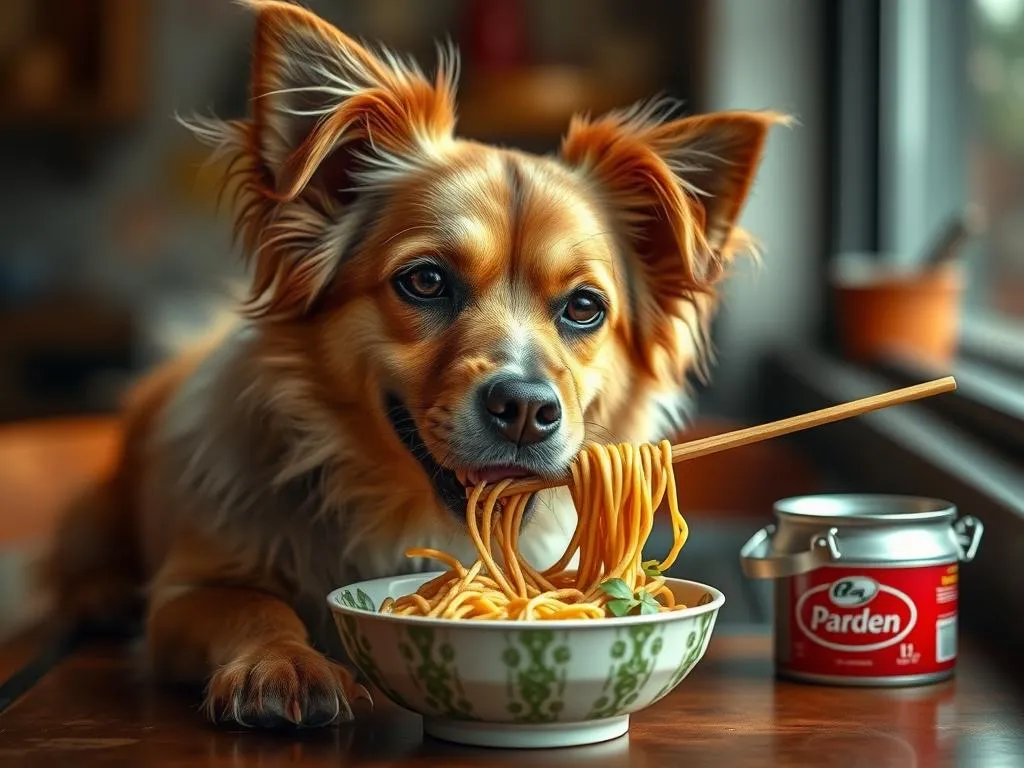
Introduction
When it comes to dog health care, nutrition plays a pivotal role in ensuring that your furry friend leads a happy and healthy life. Proper nutrition not only supports a dog’s physical health but also enhances its behavioral well-being. However, there are many misconceptions regarding what constitutes a healthy diet for dogs, particularly concerning human foods.
This article aims to explore the question: can dogs eat ramen noodles? Understanding the implications of feeding your dog ramen noodles will help you make informed decisions about your pet’s diet while also shedding light on general canine nutrition and health care practices.
Understanding Dog Nutrition
Basics of Canine Nutrition
Dogs, like humans, require a balanced diet to thrive. The essential nutrients for dogs include:
- Proteins: Crucial for muscle development and overall health.
- Fats: Provide energy and support cell structure.
- Carbohydrates: Serve as a source of energy and aid in digestion.
- Vitamins and Minerals: Vital for various bodily functions and immune system support.
A balanced diet ensures that dogs receive the right proportions of these nutrients, contributing to their overall well-being and longevity.
Common Human Foods and Their Effects on Dogs
While many human foods can be safe for dogs, others can pose serious health risks. For example, foods like chocolate, grapes, and onions are toxic to dogs. Conversely, some human foods, such as cooked chicken or certain vegetables, can be beneficial.
Feeding dogs human food can lead to unintended consequences, including digestive issues and obesity. It’s crucial to understand which foods are safe and which are not before introducing any human food into your dog’s diet.
Ramen Noodles: An Overview
What Are Ramen Noodles?
Ramen noodles are a popular staple in many households, especially for quick meals. Typically made from wheat flour, water, and salt, they are often served in a broth with various toppings. The nutritional breakdown of ramen noodles includes:
- Calories: Approximately 380 per serving (instant version).
- Carbohydrates: High carb content, around 50-60 grams.
- Protein: Usually low, about 10 grams.
- Fat: Moderately low, around 14 grams.
- Sodium: A significant concern, sometimes exceeding 1,800 mg per serving, depending on preparation.
Types of Ramen Noodles
Ramen noodles come in various forms, primarily categorized as instant ramen and fresh ramen.
- Instant Ramen: Usually precooked and dehydrated, they are quick to prepare but often contain high levels of sodium and preservatives.
- Fresh Ramen: Made from fresh dough, these noodles typically have a better texture and flavor, but they can also contain additives.
Understanding these differences is essential when considering whether to share ramen noodles with your dog.
Can Dogs Eat Ramen Noodles?
Safety of Ramen Noodles for Dogs
The short answer is that while dogs may technically consume ramen noodles, it is not advisable. Here are several reasons why:
-
High Sodium Content: Most ramen noodles are loaded with sodium, which can be harmful to dogs. Excessive sodium intake can lead to dehydration, increased blood pressure, and other health issues.
-
Preservatives and Additives: Instant ramen often contains preservatives and artificial flavors that could irritate a dog’s stomach or lead to allergic reactions.
-
Wheat and Gluten: Many dogs are sensitive or allergic to wheat and gluten, common ingredients in ramen noodles. This can lead to digestive issues or skin problems.
Nutritional Value of Ramen Noodles for Dogs
When considering the nutritional value of ramen noodles for dogs, the benefits are minimal compared to dog-friendly foods. Ramen noodles primarily provide carbohydrates, which are not essential for dogs. While they may be enjoyable as an occasional treat, they lack the essential nutrients required for a balanced diet.
In comparison, dog-friendly foods like lean meats, vegetables, and grains provide adequate protein, healthy fats, and essential vitamins and minerals, making them far more suitable options for your pet.
Expert Opinions
Veterinarians generally advise against feeding dogs ramen noodles. According to experts, the health risks associated with high sodium and potential allergens far outweigh any enjoyment dogs might get from consuming them. Anecdotal evidence from dog owners supports this perspective, with many reporting digestive issues and other health complications after feeding their dogs human foods like ramen.
Alternatives to Ramen Noodles
Healthy Human Foods for Dogs
If you’re considering sharing food with your dog, there are plenty of healthy human food options. Some safe and nutritious choices include:
- Cooked Chicken: A great source of protein, as long as it’s boneless and skinless.
- Carrots: Low-calorie and high in vitamins and fiber.
- Sweet Potatoes: Nutritious and rich in fiber, these can be served cooked and mashed.
- Green Beans: Low in calories and high in fiber, they can be served raw or cooked.
You can also explore homemade dog food recipes that combine these ingredients into balanced meals designed specifically for canine health.
Commercial Dog Food Options
Selecting high-quality commercial dog food can simplify the task of ensuring your dog receives balanced nutrition. Look for brands that:
- Use real meat as the primary ingredient.
- Avoid fillers and artificial additives.
- Are formulated to meet the nutritional needs based on your dog’s age, size, and health.
Always consult with your veterinarian to choose the most appropriate food for your dog’s specific needs.
Recognizing Signs of Dietary Issues
Common Symptoms of Food Intolerance
If your dog has an adverse reaction to food, it may exhibit various symptoms, including:
- Digestive Issues: Vomiting, diarrhea, or excessive gas.
- Skin Reactions: Itching, redness, or rashes.
- Behavioral Changes: Lethargy or changes in appetite.
If you notice any of these symptoms after introducing a new food, consult your veterinarian for guidance.
Importance of Regular Vet Check-ups
Regular veterinary check-ups play a crucial role in maintaining your dog’s health. A vet can provide dietary advice, recommend appropriate food, and identify any potential health issues early on. It’s generally recommended to schedule check-ups at least once a year, or more frequently for older dogs or those with health concerns.
Conclusion
In summary, while the question of can dogs eat ramen noodles may seem trivial, it serves as an important reminder of the complexities surrounding canine nutrition. Ramen noodles pose several health risks for dogs, including high sodium content and possible allergens. Instead, focus on a balanced diet using dog-friendly foods that provide essential nutrients.
Understanding what constitutes a healthy diet for your dog and practicing responsible feeding habits will contribute significantly to your pet’s overall health and happiness. Always prioritize your dog’s specific dietary needs and consult with veterinary professionals when in doubt.
By fostering a balanced approach to dog health care and nutrition, you can ensure your furry friend enjoys a long, vibrant life filled with joy and vitality.









